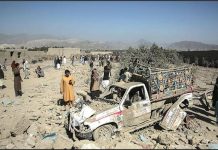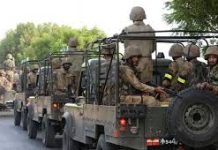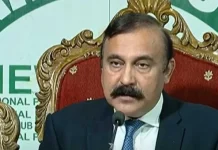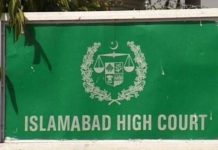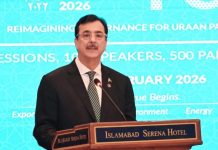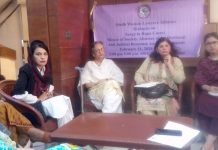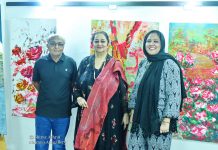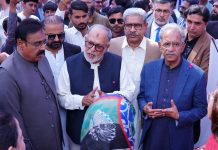She recalls the glorious period of Junagad hwhen Nawabs of Junagadh ruled there
She is determined to raise the Junagadh IssueattheInternational Fora

Althoughherfamilyhadlostitsstate,wealth,andmaterialassets,she still is very rich and possesses spiritual, moral, and ethical values, a highly educated, cultured lady with a firm belief in Almighty Allah. We have witnessed her hospitality which was an integral part of NAWABSOFJUNAGADHSTATE.Itwasapleasantandwonderful experience to talk and exchange views with Her Royal Highness Mohtarma Aaliya Dilawer Khanji at her residence, “Junagadh House”. She is the custodian of the values, history, and traditions of Junagadh state. A very soft-spoken, intelligent, and equipped with modern education but has not forgotten her Eastern and Islamic values inherited by her forefathers.

The News Lark is a group of publications and part of Jamlik Marketing Services, a visionary media group committed to promoting Pakistan’s soft and positive image and has specialization in Diplomatic and International Affairs.Its CEO and chief Editor Jawed Malik and Senior Research Editor Dr. Syed Mehboob lead a team of well-qualified and dedicated youth working with missionary spirit to highlight Pakistan and Friendly countries’ relations and future prospects. The News Lark has earned high respect in diplomatic circles and received several awards. As its, continuous efforts for the cause of Pakistan its team comprised of Jawed Malik, Dr. SyedMehboob,and YusufMalikpaida visit toJunagadhHouse to have an interview and to discuss the background and current situation of Junagadh with Her Highness Princess Aaliya Dilawer Khanji. It was a very pleasant experience for the News Lark team. The hospitality and high values Her Highness inherited from her ancestors were highly impressive.

Sharingthehistoryandbackground ofJunagadh shesaidJunagadh waswellwell-organized,well-disciplinedrichstatewithagoodtrack record of good governance, exemplary tolerance, religious harmony awelfarestate.Itwasoneofthefivehundredandsixty-two562

princely states of the subcontinent. The Nawab of Junagarh took remarkable steps to administer and develop the state.It was a prosperous state that was the second largest among Muslimstates in revenuegeneration.Ithad astandingarmyofitsown,arailwayand postal system, and sixteen (16) small and big ports. The state had an effective political and governance system that ensured peace and order in the state. The ruler of the state promoted education in the state, and it was free for all the residents of the state irrespective of their religion or caste. Furthermore, the state provided free health facilities and food for needy people without discrimination.

ShefurthersaidthatJunagadhwasamaritimestateintheKathiawar Peninsula.,300milesdownthecoastfromKarachi.Itsareawas3,337 square miles or 8,642 square kilometers and about 700,000 population according to the census of 1941. Junagadh city was its capital. Junagadh state was declared an independent sovereign state by SHER KHAN BABI in 1736. It has been ruled by the NAWABS OF the BABI DYNASTY ever since. The Nawabs of Junagadh did not only establish the state but also developed it economically, politically, and socially.
She recalls the history of Junagadh and said it can be traced back to 250 BC. The Greeks and Romans named this region, Saurastrene “which during Muslim rule became “Soorath”. The region is named as“Kathiawar“duetothepeopleknownas“Kathis”whoenteredthe regioninthethirteenthandfourteenthcenturiesfromSindh.In1297, Sultan Alauddin Khilji conquered Gujrat and made it a province of the Delhi Sultanate. It was governed by the sovereigns of Delhi from 1297 to 1403. Then the Ahmedabad kings, also known as the Sultan ofGujrat,ruledoverGujratfrom1403to1573.In1403,SultanZafar Khan declared Gujrat Independent from Delhi and founded the GujratSultanate.In1573theMughalEmpireconqueredtheGujrat Sultanate.TheMughalsdeclaredGujrataprovinceoftheirempire.

They ruled over Gujrat till 1758 when the Mughal viceroy Momin Khan was defeated by the Marathas. In 1556, the Mughal Emperor Humayun Khan regained the throne with the help of Afghan tribes.
USMAN KHAN BABI who was the Chief of the Yusufzai tribe, also gave his full support to Humayun. The Mughal emperor Humayun promoted Usman Khan to a higher position in the Mughal Army in return for his support. Bahadur Khan Babi, son of Usman Khan Babi, remained in the Royal Service of Emperor Akbar during the latterpartofhisruleandrosetoprominenceduringtheruleofShah Jehan and received lands in Gujrat. SHER KHAN BABI, son of BahadurKhan,wasafavoriteofAurangzebAlamgirforhisservices insuppressing theuprising in the Gujratand adjoining territory.In 1693, Jafar Khan, the son of Sher Khan was given control of Munjpur, Sami, Radhanpur, and Tervada. He was also given the governorship of Bijapur and Patan.
With the death of Aurangzeb in 1707, the period of strong administration and peaceful progress in Gujrat witnessed a decline. The Marathas took advantage of the circumstances and started bloodshed and looting in Gujrat and Kathiawar. In 1728, the governor of Junagadh Asad Ali died and appointed Salabat Khan Babi as the Deputy Governor of Junagadh on his deathbed. Salabat KhanBabiinstructedhissonSHERKHANBABItoactonhisbehalf as a deputy governor of Junagadh. SHER KHAN BABI established the BABI DYNASTY in 1736 including Junagadh, Kathiawar.
JunagadhRulers
| Name | Reign(AD) |
| Muhammad Sher Khan Babi or Muhammad Bahadur Khanji I | 1736-1758 |
| MuhammadMahabatKhanjiI | 1758-1774 |
| MuhammadHamidKhanjiI | 1774-1811 |
| MuhammadBahadurKhanji I | 1811-1840 |
| MuhammadHamidKhanjiII | 1840-1851 |
| MuhammadMahabatKhanjiII | 1851-1882 |
| MuhammadBahadurKhanji II | 1882-1892 |
| MuhammadRasulKhanji | 1892-1911 |
| MuhammadMahabatKhanjiII | 1911-1948 |
Telling about the hierarchy in the Junagadh State, she said that the title of the head of the state was, “Nawab”. It was the hereditary systeminwhichtheheadwasappointedbytheNawabinhislifewho was called, “Wali-E- Ehd”. There were two political institutes i.e., “State Council” and “Advisory Council “The members of the state councilwerecalled,”Ministers”.Aheadofthecabinetwasknownas, “Dewan or the Prime Minister”. The Dewan was selected by the will of Nawab.
The reign of Nawab Mahabat Khanji II was the pinnacle of administrative reforms in the state. He brought unprecedented reform in the political, economic, and social sectors. In 1863, he formed two cabinets, the state council, and the advisory council, to bring reforms to the administration of the state. He also improved and organized the judicial system in 1863 to maintain law and order in the state. In this system, thirty criminal courts were set up for criminal cases and twenty-six civil courts for civilian cases. Competent judges were appointed who ruled beyond religious and racial prejudices. The education department has the special supervision of the Nawab, therefore, the department was given a lot of financial support. A monthly magazine, “Dastur ul Amal” was launched at the official level to keep the people informed about government messages, state departments, and international news.
In 1870, the police department was reorganized. Crown Prince Bahadur Khanji was appointed as Police Commissioner. Nawab Mahabat Khanji III formed an organized force exclusively in the statenamedJunagadhStateInfantry.Junagadhstatewasfamousfor itsportsandlongcoastallinetherefore,itwasalsoakeysourceof
incomeforthestateapartfromagricultureandtrade,whichwerethe main sources of income for the people of the state in the beginning. Hamid Khanji II made efforts, in the early days to improve the economy of the state. One of his efforts was the mining of gold. In 1842, work was started to extract gold from the river. In 1876 total revenue was Rs. 1.817 million. The income resources of the state increased from just agricultural and trade to land revenue, customs, toll taxes, and the manufacturing sector.
About the trade activities of the state, she said the merchants of Junagadh expanded their business abroad after establishing trade centersinthestate.Theyalsoownedafewforeigncompaniesbesides vegetableoilcompany,WesternIndiaMatchCompany,JataOil,and Burma Oil, various industrial units, were set up which were controlled by well-versed industrialists of the state. A sugar factory in the state city of Shahpur a sewing factory at Veravel a leather factory at Nawagadh. In 1945 a joint venture was agreed upon, between the state industrialists and the government.
Regarding the promotion of education, she said that remarkable Educational reforms were brought in Junagadh state by Nawab MahabatKhanjiII.He,duetohiskeeninterestineducation,opened newdepartmentsandeducationalinstitutionstoproduceeducational facilitiesforthepeople.Inrecognitionoftheestablishmentofwelfare andpublicservices,hewasgiventhetitleof“Sir”bythegovernment oftheUnitedKingdom.Heestablishedthefirsteducationdepartment in1854.EightyEducationalDepartmentswereoperatinginthestate by the end of his reign. He also paid special attention to girls in the state and established a school of girls in September 1862, which was named after Nawab’s Begum Ladli Bibi Kinyshala (School).
She further elaborated that in 1867, he built a library named after Prince Bahadur Khanji to promote the trend of education and academicresearchamong thepeopleofJunagadh.Inthesameyear,
aprintingpresswasalsosetupbythestatetoprintbooks,magazines, and newspapers. In 1873 Nawab Mahabat Khan II, in collaboration with the Mumbai Board of Education, started to raise funds to open amodernschoolnamed,“BahadurKhanjiHighSchool”inthestate.
Sheproudlysharestheeffortsofherforefathersintheinfrastructure development of Junagadh and said that Nawab Mahabat Khanji II took a deep interest in the development of the infrastructure of the state.NawabRasoolKhanjibroughttheinfrastructuredevelopment workofthestate toitspeak.BeingconnectedtotheArabianSea,the existence of the Junagadh state at the most important geostrategic locationmadethestatesignificantinvariousways.Thestatenotonly has large reserves of limestone but is also rich in mineral resources duetohillyterrain.Highlightingthesignificanceofthestateshesaid that Junagadh was self-sufficient in agricultural products and commodities such as wheat, cotton, oilseeds, bananas, mangoes, onions,andgarlicwerealsosuppliednotonlytootherportsofBritish Indiabutnumerousotherregionsoftheworldresultingcollectionof hugerevenues.Thestate’sseaportsandsealanesalongcoastalareas like Chorwad,Veraval,Sutra Pada,Velan, Sar Khadi, Rajpara,and Jafarabad were further enhancing the geo-economic worth of the state. The sea route was connecting the state not only with Pakistan butalsowithotherpartsoftheworld,whichresultedinanincrement of state exports.
Regarding the accession of Junagadh with Pakistan she said that Junagadhwas the first princely state that announced its accession to Pakistan on 15th August 1947. Pakistan never recognized the Indian occupation of Junagadh and Bantwa-Manavadar on its map. However, it has been a tragedy of Pakistan’s foreign policy for the last few decades that only Kashmir has been connected at international forums, and there was no significant discussion regardingIndianoccupationofthestateofJunagadh,Bantwa- Manavadar, and numerous other Muslim majority areas since 1948 to onwards. However, the second decade of the 21st century will always be remembered because Pakistan not only once again began to declare Junagadh, Bantwa-Manavadar, and Sir Creek as its territories at every international forum. August 4, 2020, was a historicaldaywhenthenewmapofPakistanwasunveiled.Although India’s strong diplomatic stance was ignored by most countries it remain silent on this issue. This was because of their political and economic interests with both: India and Pakistan. When Russia hosted the National Security Advisers’ meeting of Shanghai Cooperation Organization (SCO) member states, Ajit Dovel walked out from the meeting only because the National Security Adviser of PakistanMr.MoeedYousafhadpostedanewmapofPakistaninhis background wheretheterritories ofJunagadh,Bantva-Manavadar, and Sir Creek were declared as Pakistani areas. Russia was hosting themeetingandIndiasubmitteditsobjectiontoRussiathatthemap shouldnotbeusedasabackground.However,argumentsfromIndia were turned down and Pakistan was allowed to show the map which wasasuccessaswellasimpliedrecognitionofPakistan’sclaimonits territories. None of the member states including Russia, objected to Ajit Dovel leaving the meeting. SCO consists of China, Russia, Kazakhstan,Kyrgyzstan,Tajikistan,Uzbekistan,India,andPakistan aspermanentmembers,Afghanistan,Belarus,Iran,andMongoliaas observer states, Armenia, Azerbaijan, Cambodia, Nepal, Sri Lanka and Turkiye as dialogue partners and Association of South East Nations (ASEAN), Common Wealth and Independent states, United Nations and Turkmenistan as guest attendances. But no one supported or appreciated Ajit Dovel’s leftover meeting or Indian objections over map projection or map authentication. The analysts assume respective map diplomacy as the diplomatic success of Pakistan inthe international arenawhere regional states recognized the issue of Junagadh and Bantwa- Manavadar as an international dispute under the large framework of international law.
RegradingstrategytofurtherhighlightJunagadhissuessheproposed thatPakistancanexposeIndia’sillegaloccupationofrespectiveareas as well as Pakistan can become the voice of the subjugated people of these occupied territories all over the world.
Sheisalso worriedabout theplight ofthepeopleof Junagadhwhose forefathers migrated from India and settled in Pakistan. Thanks, Allah Almighty they are living in an independent state and are one hundred percent patriotic and loyal to Pakistan but they face numerous problems including joblessness, lack of education, water, andotherfacilities.Shewantsthegovernmenttoaddresstheseissues and to resolve them.
When the News Lark team left the Junagadh house it had a deep admiration for the acumen, intelligence, and adherence to ancestral valuesofHerRoyalHighnessPrincessAaliya.TheNewsLarkandits team are committed to promoting the Junagadh cause and think ignorance and neglecting Junagadh is not in the interest of Pakistan anditisthedutyofourembassiesabroadandourmediatohighlight this issue internationally.

